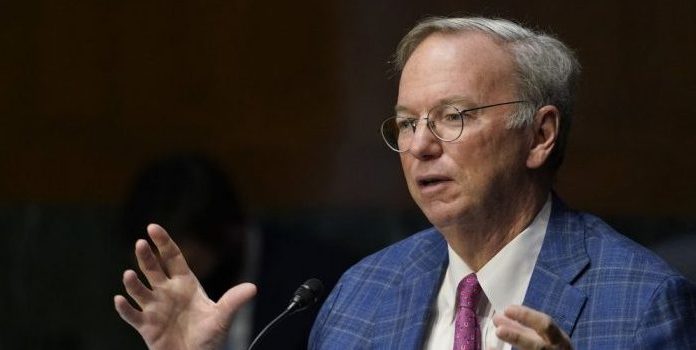(Joshua Paladino, Headline USA) Billionaire Eric Schmidt, a former Google CEO, treated the White House’s Office of Science and Technology Policy as a private organization by influencing its former director, paying salaries for its employees, and putting his current and former employees into the agency.
Among the richest 30 people in America, Schmidt has an estimated net worth at $26.8 billion. He funneled his wealth, through Schmidt Futures, a non-profit that funds science and technology research, to direct the Biden administration’s policies, reported Politico.
Schmidt had a personal relationship with the office’s former director, Eric Lander, who resigned along with several other employees amid accusations that the Big Tech billionaire had “what staffers describe as an unusual level of influence.”
Schmidt Futures paid the salaries of Marc Aidinoff, the office’s current chief of staff, and of former chief innovation officer Tom Kalil, who resigned after Schmidt’s influence over him became public.
The non-profit organization claimed that its funding helped “focus and mobilize these networks of talent to solve specific problems in science and society,” but whistleblower Rachel Wallace, a former general counsel, claimed that Schmidt’s influence raised “significant” ethical problems.
Wallace’s concerns stem from Schmidt’s immense financial and personal interests in technology companies, including a 20-percent investment in DE Shaw, which has a $55 billion portfolio (the 10th largest hedge fund in the world) that focuses on technology investments.
Schmidt is a board member for Rebellion Defense, a defense contractor specializing in artificial intelligence, and for Civis Analytics, a Democrat campaign company that backed President Joe Biden in 2020. He also has investments in Abacus.AI and Sandbox AQ—two other technology firms.
For the first year of Biden’s term, OSTP employees noticed conflicts on interest, but nothing happened until Wallace submitted a complaint with “credible evidence” about Lander’s inappropriate personal and professional behavior toward her.
“I and others on the legal team had been noticing a large number of staff with financial connections to Schmidt Futures and were increasingly concerned about the influence this organization was able to have through these individuals,” said Wallace, who the Government Accountability Project represents as a whistleblower.

